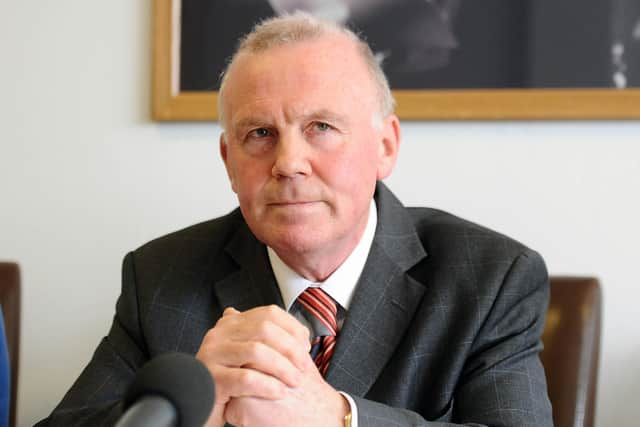Top medical journal: Covid-19 pandemic has unleashed state corruption on a grand scale, says BMJ
and live on Freeview channel 276
The recent editorial from the BMJ (formerly British Medical Journal) was scathing of the authorities in England, though made no allegations about NI.
The BMJ said: “Science is being suppressed for political and financial gain. Covid-19 has unleashed state corruption on a grand scale, and it is harmful to public health. Politicians and industry are responsible for this opportunistic embezzlement. So too are scientists and health experts.”
It noted that:


Advertisement
Hide AdAdvertisement
Hide Ad• The membership, research, and deliberations of the Scientific Advisory Group for Emergencies (SAGE) were initially secret, until leaked.
• The Public Health England report on covid-19 and inequalities was initially withheld and the authors instructed not to talk to the media.
• The editor of the Lancet complained that an author of a research paper, a UK government scientist, was blocked by the government from speaking to the media.
• The government procured an antibody test that falls well short of performance claims made by its manufacturers and when researchers sensibly pushed to publish their study findings before the government committed to buying a million of the tests, they were blocked by the health department and the prime minister’s office. Public Health England then unsuccessfully attempted to block The BMJ’s press release about the research paper.
Advertisement
Hide AdAdvertisement
Hide AdThe BMJ added: “Politicians often claim to follow the science, but that is a misleading oversimplification. Science is rarely absolute. It rarely applies to every setting or every population. It doesn’t make sense to slavishly follow science or evidence. A better approach is for politicians, the publicly appointed decision makers, to be informed and guided by science when they decide policy for their public. But even that approach retains public and professional trust only if science is available for scrutiny and free of political interference, and if the system is transparent and not compromised by conflicts of interest.”
The BMJ’s proposed solution is “full disclosure of competing interests from government, politicians, scientific advisers, and appointees” and “full transparency about decision making systems, processes, and knowing who is accountable for what”.
Although there has been no suggestion of any corruption in NI, there have been consistent calls - for months - for scientific advice to the Executive to be released for public consumption.
GP and deputy leader of the PUP, Dr John Kyle, said the BMJ editorial was “an extremely important statement” about the Tory government’s performance. In NI there has been “inadequate disclosure of the data which has informed the decisions of the Minister and the Executive” he said. “Given the life changing consequences of these decisions it is imperative that the public understand the justification for the measures and the scientific advice underpinning them. Otherwise public confidence is lost, people will oscillate between fear and frustration, and we will descend into chaos.”
Advertisement
Hide AdAdvertisement
Hide AdDr Tom Black, of the British Medical Association also responded, calling for the Executive’s regular scientific briefing papers to be released to the public “as this will hopefully aid compliance and a better understanding of the overall effect individual actions have on the wider system, and how as individuals we can contribute to easing pressure in hospitals and improving the delivery of services.”
Also commenting, the Alliance Party said that it is “committed to maximising openness and transparency in government”. A spokesman added: “The presumption should be in favour of publication unless there is a substantive argument for withholding information, for example for reasons of security, commercial confidentiality or where it relates to policy development.”
The News Letter asked the Department of Health i) Why it does not release the regular scientific advice papers given to the Executive for public consumption and ii) Why it is withholding some documents from Freedom of Information requests relating to Exercise Cygnus, a UK-wide pandemic planning exercise in 2016. The Department gave no direct answer to either question.
It said: “The Department continues to work across UK, NI Civil Service and with health and social care providers to continue to build on our resilience and emergency preparedness, and in addition to the Pandemic Flu Preparedness Board programme.”
Advertisement
Hide AdAdvertisement
Hide AdIt added: “The Department greatly values informed public debate and discussion on NI’s response to the pandemic. That is why we have brought a large number of relevant documents on key Covid-related issues together in our published evidence bank.” The bank includes reports from SAGE, weekly papers on the R number in NI. www.health-ni.gov.uk/covid-19-scientific-evidence
The Department of Health added later: “It is for the Executive to decide if advice provided to Executive meetings should be made public. There is a long standing principle that advisers advise and Ministers decide. Having reached their decisions, Ministers can then explain them to the public, drawing from the expert advice provided.”
READ FULL BMJ EDITORIAL: Covid-19: politicisation, “corruption,” and suppression of science
A message from the Editor:
Thank you for reading this story on our website. While I have your attention, I also have an important request to make of you.
Advertisement
Hide AdAdvertisement
Hide AdWith the coronavirus lockdown having a major impact on many of our advertisers - and consequently the revenue we receive - we are more reliant than ever on you taking out a digital subscription.
Subscribe to newsletter.co.uk and enjoy unlimited access to the best Northern Ireland and UK news and information online and on our app. With a digital subscription, you can read more than 5 articles, see fewer ads, enjoy faster load times, and get access to exclusive newsletters and content. Visit https://www.newsletter.co.uk/subscriptions now to sign up.
Our journalism costs money and we rely on advertising, print and digital revenues to help to support them. By supporting us, we are able to support you in providing trusted, fact-checked content for this website.
Alistair Bushe
Editor